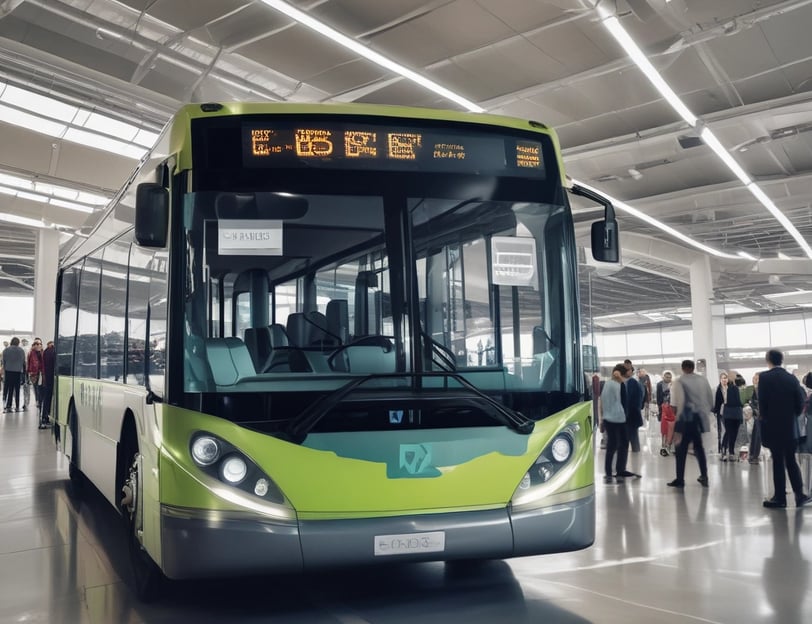"How Hitachi and COBUS Are Revolutionizing Airport Mobility with Smart EV Battery Analytics".
Hitachi ZeroCarbon partners with COBUS Industries to equip 100 e.COBUS ER buses with cutting-edge battery analytics. Discover how this collaboration is optimizing fleet efficiency, reducing costs, and reshaping airport mobility for a sustainable future.
BLOG POST
evnovatech.com
12/22/20244 min read


"How Hitachi and COBUS Are Revolutionizing Airport Mobility with Smart EV Battery Analytics"
Hitachi ZeroCarbon Powers COBUS Electric Fleet with Smart Battery Analytics.
Airports around the world are striving for sustainability, and electric vehicles (EVs) are at the heart of this transformation. In an exciting new development, Hitachi ZeroCarbon has joined forces with COBUS Industries to accelerate the decarbonization of airport mobility. Together, they aim to revolutionize fleet management with a cutting-edge battery analytics solution that promises to optimize EV performance, extend battery life, and reduce costs.
By 2025, Hitachi ZeroCarbon will equip 100 e.COBUS Extended Range (ER) electric buses with its innovative ZeroCarbon BatteryManager. Let’s dive into how this partnership is setting new benchmarks for sustainable fleet operations and reshaping the passenger experience.
The Partnership: A Step Towards Net-Zero Airports
COBUS Industries has been a global leader in airport mobility solutions for decades, with its iconic buses ferrying millions of passengers annually. The company’s shift to electric buses marks a significant step toward achieving net-zero emissions in the aviation sector.
Hitachi ZeroCarbon’s BatteryManager solution is central to this transformation. It provides real-time insights into battery health and performance, enabling COBUS and its customers to:
Reduce total cost of ownership (TCO).
Extend the lifespan of EV batteries.
Enhance residual value by maintaining battery integrity.
Patricia Vasconcelos, CEO of COBUS Industries, explains, “Electrifying our bus network is just the start. To truly deliver a seamless passenger experience and sustainable operations, we need advanced tools to manage our EV assets effectively. Hitachi ZeroCarbon provides a globally scalable solution that delivers real business value.”
Unlocking the Power of Battery Analytics
Battery analytics is not just about monitoring; it’s about transforming data into actionable insights. Hitachi’s ZeroCarbon BatteryManager does exactly that by offering:
Real-Time Monitoring: Continuous tracking of battery health to identify potential issues early.
Proactive Alerts: Early warning signals to address faults before they escalate, minimizing downtime.
Route Optimization: Insights to plan routes that maximize efficiency and minimize battery stress.
Comprehensive Reporting: Detailed reports to support operational planning and decision-making.
These capabilities not only improve fleet reliability but also create a smoother passenger experience—a critical factor in airport operations.
Addressing Operational Challenges
Airport environments are unique and demanding. Electric fleets must operate in diverse conditions, from extreme climates to varying terrains. Ram Ramachander, CEO of Hitachi ZeroCarbon, highlights how their solution addresses these challenges:
“When we discuss fleet electrification with managers, a common question is how EV batteries can cope with different operational environments. With COBUS, we’re demonstrating how to retain long-term battery value while adapting to diverse conditions globally.”
This adaptability ensures that airports worldwide can rely on COBUS electric fleets to deliver consistent performance regardless of local challenges.
Sustainability at the Core
The environmental benefits of this partnership are profound. By enabling efficient battery management, Hitachi and COBUS are reducing the need for frequent battery replacements, thereby lowering the environmental impact of raw material extraction and waste.
Additionally, the ZeroCarbon BatteryManager enhances energy efficiency, contributing to a reduced carbon footprint for airport operations. This aligns perfectly with the aviation industry’s broader goals for net-zero emissions.
India’s Role in the Green Revolution
Bharat Kaushal, Managing Director of Hitachi India, emphasizes the significance of this collaboration for India’s sustainability journey:
“As India accelerates toward carbon neutrality by 2070, this partnership is a pivotal step. Hitachi ZeroCarbon’s solutions are laying the foundation for a resilient EV battery ecosystem, driving the green revolution across the nation’s airports.”
With its deep-rooted collaboration in India spanning nine decades, Hitachi is poised to play a key role in transforming airport mobility and beyond.
The Road Ahead: Scaling Innovation
By 2025, the deployment of 100 e.COBUS ER buses equipped with ZeroCarbon BatteryManager will be a testament to the scalability and impact of this partnership. But this is just the beginning. The insights gained from managing these assets globally will pave the way for:
Smarter fleet electrification strategies.
Enhanced resilience against operational risks.
Broader adoption of sustainable mobility solutions in other sectors.
As Hitachi and COBUS continue to innovate, the lessons learned from their collaboration will shape the future of EV fleet management worldwide.
FAQ Section
1. What is the ZeroCarbon BatteryManager? It’s a cutting-edge solution by Hitachi ZeroCarbon that provides real-time insights into EV battery health and performance, helping fleet operators optimize efficiency and reduce costs.
2. How will this partnership benefit airport operations? By equipping e.COBUS buses with advanced battery analytics, airport fleets can reduce downtime, improve reliability, and deliver a seamless passenger experience.
3. What environmental impact does this collaboration have? Efficient battery management reduces the need for replacements, lowering the demand for raw materials and minimizing waste. It also improves energy efficiency, cutting carbon emissions.
4. How does the system handle diverse operational environments? The ZeroCarbon BatteryManager adapts to various climates and terrains, providing data-driven insights to optimize battery performance in different conditions.
5. What is the long-term vision for this partnership? The goal is to scale the solution globally, demonstrating its impact on sustainable mobility and fostering innovation in EV fleet management across industries.
6. How does this align with India’s sustainability goals? The partnership supports India’s carbon neutrality roadmap by building a robust EV battery ecosystem and driving sustainable airport mobility solutions.
This collaboration between Hitachi ZeroCarbon and COBUS Industries isn’t just about electrifying airport fleets—it’s about reimagining what sustainable mobility can achieve. With smarter battery management, airports worldwide are poised to set new standards in efficiency, reliability, and environmental stewardship.
